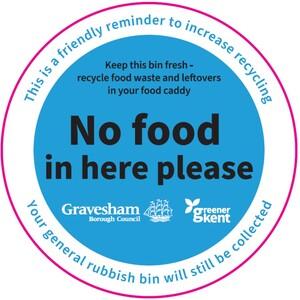Food waste campaign
We all aim to use the food we buy. When it is unavoidable, recycling is the next best option.
25% of food waste ends up in general rubbish bins in Gravesham. We offer free outdoor food caddies and weekly collections.
No food in here
In partnership with Kent County Council (KCC) we are running a campaign to encourage food waste recycling.

The food waste campaign will run throughout June 2025, during which all households will receive:
- A helpful food waste recycling guide
- A roll of compostable bin liners
- A bin sticker 'No food in here please'
You will soon see 'no food waste here please' stickers on rubbish wheelie bins. We will still collect your refuse bin even if we have placed a sticker on it.
The aim is to encourage residents to use our food waste collection service and educate people about what happens to food waste.
Why recycle food?
If you don't already, we encourage you to use our weekly food waste collection service.
Recycling food waste is not only better for the environment, but other reasons include:
- Recycling food waste uses less energy and costs left than burning food waste mixed with general rubbish
- Recycled food waste is turned into biogas, powering over 3,000 homes annually
- Weekly food waste collections reduce odours in your general waste bin.
We are doing what we can to reduce unnecessary costs in handling waste to lower the impact on the environment.
- This campaign has been made possible with national funding
- Increased food waste recycling uses less energy and lower disposal costs so is more efficient
- Printed materials for the campaign are on Forest Stewardship Council (FSC) accredited and sustainable sourced paper
How to reduce food waste at home
Smarter food shopping and storage
- Plan meals and write shopping lists
- Store food correctly (will it last better in the fridge?
- Understand ‘best before’ vs. ‘use by’ dates
Meal planning and repurposing
- Get creative with leftovers
- Use up fruit and veg before they spoil
- Freeze food to extend its life
Recycling matters
Food waste is more than just a waste of money. It has serious impacts on climate change and the environment.
By recycling food waste, you can help reduce carbon emissions, support sustainable energy production, and improve soil health through composting.

